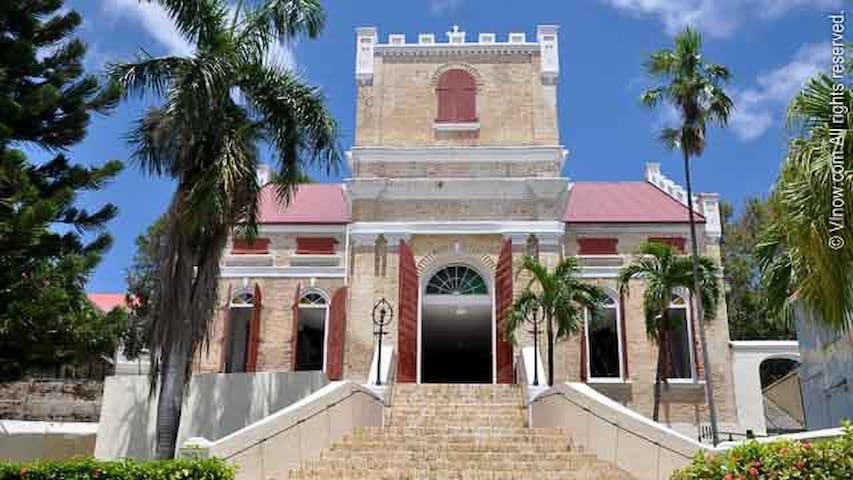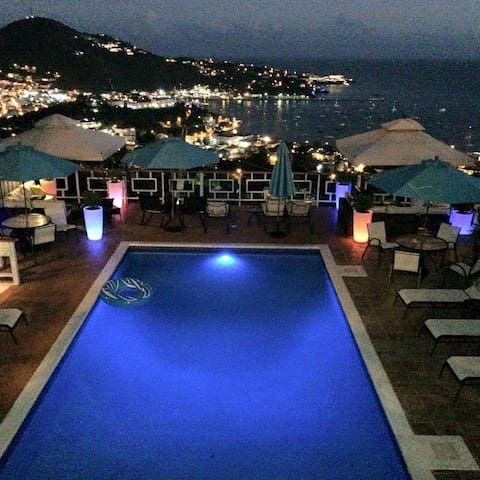Sightseeing
Magens Bay Beach
One of the top rated beaches worldwide
Coral World Ocean Park
Blackbeard's Castle
Torvet State RoadDrake's Seat, St. Thomas
One of the island's best lookouts, Drake's Seat offers a panoramic view of Magens Bay and the U.S. and British Virgin Islands to the east. The site is named for Sir Francis Drake, who is said to have kept watch over the harbor from this vantage point. (Was Drake benevolently watching over his own fleet or looking for ships to plunder? The answer will depend on whether you subscribe to the British's regard of him as a celebrated explorer or to others' belief that he was a brutal privateer.)
72 lokal ang nagrerekomenda
Drake's Seat
Route 37Drake's Seat, St. Thomas
One of the island's best lookouts, Drake's Seat offers a panoramic view of Magens Bay and the U.S. and British Virgin Islands to the east. The site is named for Sir Francis Drake, who is said to have kept watch over the harbor from this vantage point. (Was Drake benevolently watching over his own fleet or looking for ships to plunder? The answer will depend on whether you subscribe to the British's regard of him as a celebrated explorer or to others' belief that he was a brutal privateer.)
Mountain Top
A national historic landmark. Governor Jørgen Iversen led the second expeditionary force from Denmark to St. Thomas, where he arrived on May 25, 1672; there, he initiated construction of Fort Christian, named after Danish King Christian V. By 1676, builders had completed the fort's outer walls and placed a three-story oval tower in the courtyard against the north curtain. Trygborg, as the tower was named, had gun platforms on its two upper stories and roof. In February 1678, two years after construction began, a French force attacked St. Thomas and was repulsed. Until it was demilitarized during the 1870s, the fort underwent enlargement and repair; after the military departed, Fort Christian served as the police headquarters of the Virgin Islands. In the ensuing years, Trygborg tower and the north curtain were demolished, along with the entire north and most of the east ravelins. The present one-story Gothic revival structure, with its centered three-tiered tower, was built between the northeast and northwest bastions to replace the demolished north curtain.
41 lokal ang nagrerekomenda
Fort Christian
Forts StraedeA national historic landmark. Governor Jørgen Iversen led the second expeditionary force from Denmark to St. Thomas, where he arrived on May 25, 1672; there, he initiated construction of Fort Christian, named after Danish King Christian V. By 1676, builders had completed the fort's outer walls and placed a three-story oval tower in the courtyard against the north curtain. Trygborg, as the tower was named, had gun platforms on its two upper stories and roof. In February 1678, two years after construction began, a French force attacked St. Thomas and was repulsed. Until it was demilitarized during the 1870s, the fort underwent enlargement and repair; after the military departed, Fort Christian served as the police headquarters of the Virgin Islands. In the ensuing years, Trygborg tower and the north curtain were demolished, along with the entire north and most of the east ravelins. The present one-story Gothic revival structure, with its centered three-tiered tower, was built between the northeast and northwest bastions to replace the demolished north curtain.
Skyride to Paradise Point
Virgin Islands Legislature
Gallery Camille Pissarro
Shopping
Charlotte Amalie
Yacht Haven Grande
Upscale boutiques, restaurants. Expensive
Grocery stores close at 8pm
Pueblo Super Market at Long Bay
Rumer DriveThe Fruit Bowl
Route 38Organic and health foods
Additional location on the waterfront. Great fresh and gourmet food.
79 lokal ang nagrerekomenda
Moe's Fresh Market Redhook
Additional location on the waterfront. Great fresh and gourmet food.
Historic churches
Memorial Moravian Church
Frederik Evangelical Lutheran Church was established in 1666, the same year that Erik Nelson Smith took formal possession of the island of St. Thomas in the name of the Danish West India Company. The original colonizing group included a Luther a Lutheran Pastor, Kjeld Jensen Skagelse. A few months after the settlement landed Smith died, and the Luther Pastor had to assume temporal, as well as spiritual, leadership. The Lutheran Church during the early decades of the Danish colony was closely allied with the development of the colony. The settlement was a venture of private enterprise by the stockholders of the Danish West India Company under a charter by the royal government. This charter included a provision that the Lutheran Church (the state religion of Denmark) was to be maintained in the colony and the company was to select appropriate ministers to serve it. When St. Thomas became a crown colony through purchase of the company by the State in 1754, the church was able to expand its role in community affairs very rapidly. Already it was operating schools for Lutheran children and later for slave children as well. It was a Lutheran Pastor, the Rev. Hans Stoud, who first proposed that a hospital and school should be built on each island and saw his proposal realized on St. Thomas. Thanks to the laborious efforts of Pastor Erik Wold and Mr. J. M. Magens (a Dane born on St. Thomas and of the same family after whom Magens Bay is named), Luther's Small Catechism, a hymnal and a a grammar were all printed in the Creole language by 1770. Worship services were originally held in the homes of planter and soldiers. Later space was made available at Christensfort. A small chapel was built right in the Fort courtyard, and grave markers that were set in its floor as memorials may still be seen there. Danish, Creole and later English languages were used in the worship of the Congregation. Creole was used as late as the 1840's and the last Danish services, held at Christmas only, were discontinued in the 1930's. The present building was started in 1789 and completed in 1793. Its cost was met by private donations, contributions from the government, and a considerable loan from the Danish West Indies Poor Fund. The building was gutted by the fire in 1826, but the walls remained sound and it was rebuilt. Hurricane damage was sustained in 1870, and the appearance of the present building dates from the repair and remodeling of that period. The tower was added at that time. It houses the church bell installed in 1871. A vestry was added to the rear of the building in 1951 and a sacristy in 1954. The alter was moved back behind the arch in the 1951 remodeling and the pulpit located to the west. The wood in the chancel and pulpit is local mahogany. In 1993 the 200th anniversary was celebrated by the congregation.
Frederick Evangelical Lutheran Church US VIRGIN ISLANDS
Norre Gade Frederik Evangelical Lutheran Church was established in 1666, the same year that Erik Nelson Smith took formal possession of the island of St. Thomas in the name of the Danish West India Company. The original colonizing group included a Luther a Lutheran Pastor, Kjeld Jensen Skagelse. A few months after the settlement landed Smith died, and the Luther Pastor had to assume temporal, as well as spiritual, leadership. The Lutheran Church during the early decades of the Danish colony was closely allied with the development of the colony. The settlement was a venture of private enterprise by the stockholders of the Danish West India Company under a charter by the royal government. This charter included a provision that the Lutheran Church (the state religion of Denmark) was to be maintained in the colony and the company was to select appropriate ministers to serve it. When St. Thomas became a crown colony through purchase of the company by the State in 1754, the church was able to expand its role in community affairs very rapidly. Already it was operating schools for Lutheran children and later for slave children as well. It was a Lutheran Pastor, the Rev. Hans Stoud, who first proposed that a hospital and school should be built on each island and saw his proposal realized on St. Thomas. Thanks to the laborious efforts of Pastor Erik Wold and Mr. J. M. Magens (a Dane born on St. Thomas and of the same family after whom Magens Bay is named), Luther's Small Catechism, a hymnal and a a grammar were all printed in the Creole language by 1770. Worship services were originally held in the homes of planter and soldiers. Later space was made available at Christensfort. A small chapel was built right in the Fort courtyard, and grave markers that were set in its floor as memorials may still be seen there. Danish, Creole and later English languages were used in the worship of the Congregation. Creole was used as late as the 1840's and the last Danish services, held at Christmas only, were discontinued in the 1930's. The present building was started in 1789 and completed in 1793. Its cost was met by private donations, contributions from the government, and a considerable loan from the Danish West Indies Poor Fund. The building was gutted by the fire in 1826, but the walls remained sound and it was rebuilt. Hurricane damage was sustained in 1870, and the appearance of the present building dates from the repair and remodeling of that period. The tower was added at that time. It houses the church bell installed in 1871. A vestry was added to the rear of the building in 1951 and a sacristy in 1954. The alter was moved back behind the arch in the 1951 remodeling and the pulpit located to the west. The wood in the chancel and pulpit is local mahogany. In 1993 the 200th anniversary was celebrated by the congregation.
Saints Peter and Paul Cathedral
21-22 Kronprindsens GadeFood scene
The Green House
Great food, atmosphere and views of the waterfront.
MoJo's
Mandela CirclePetite Pump Room
3400 Veterans DrOpen for lunch only
Located 5 minutes drive up the hill from Aggies ocean view! Nice place to dine and enjoy the view.
30 lokal ang nagrerekomenda
Mafolie Hotel & Restaurant
7091 EstateLocated 5 minutes drive up the hill from Aggies ocean view! Nice place to dine and enjoy the view.
Payo sa lungsod
Paano makapaglibot
Islander taxi 340-774-4077
Taxis are the easiest way to get around without driving
Paano makapaglibot
Taxis are plentiful and very affordable.
If you decide to rent a vehicle , it is advisable that you reserve in advance.. the major car agencies are located at the airport.
Paano makapaglibot
Safari bus
https://www.tripadvisor.com/Travel-g147404-s303/St-Thomas:Caribbean:Public.Transportation.html
Mga kagawian at kultura
St. Thomas island map
Stay on the left while driving https:www.openstreetmap.org/
Ang dapat iempake
Sunshine and ☔️
Bring comfortable walking shoes, and an umbrella.
Ang dapat iempake
Sun and rain tip
. Sun and Rain
While the tropics are often thought of sunshine-filled paradises, the truth is a great amount of rainfall takes place as well, after all the plants need water in order to stay lush and green. So, when you’re packing for your trip, don’t just take three bottles of sunscreen but a rain jacket or travel umbrella as well. There’s no telling when a sunny day can turn into 3 inches of rain.


